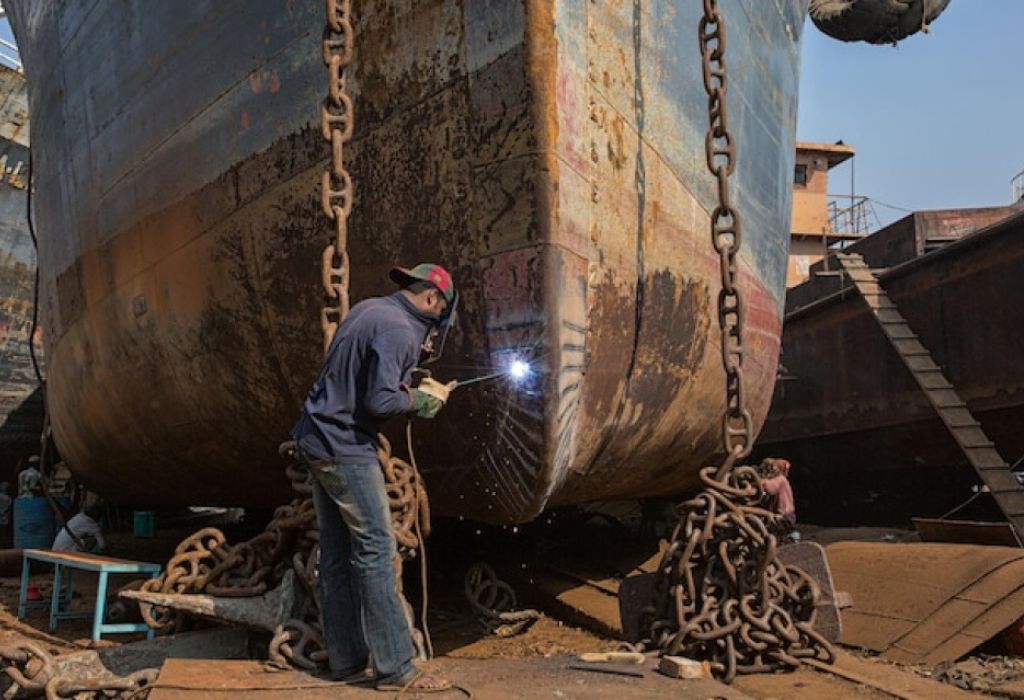Imagine standing on the deck of a colossal ship, knowing that your skilled hands helped bring it to life.
Ship welders play a pivotal role in constructing and maintaining vessels that traverse the world’s oceans. But how much does a ship welder make in 2025?
As of September 2025, the average annual salary for a ship welder in the United States is approximately $57,848, equating to about $28 per hour Salary.com.
However, this figure can vary based on several factors, including experience, location, and industry demand.
For instance, in cities like Newport News, VA, ship welders can earn up to $93,000 annually, while in Houston, TX, the average salary is around $84,000 Jooble.
Conversely, regions with lower demand may offer salaries closer to the national average.
Understanding these salary ranges is crucial for aspiring welders and those seeking to advance in their careers.
In this article, we’ll delve into the factors influencing ship welder salaries, compare wages across different states, and explore the career outlook for this essential profession.
What Is a Ship Welder?

A ship welder is a skilled tradesperson responsible for joining metal components used in shipbuilding and repair. Their work ensures the strength and durability of vessels that operate in demanding maritime environments.
The job requires precise welding techniques to assemble hulls, decks, bulkheads, and other structural parts. Ship welders must also follow safety standards and read blueprints accurately to meet strict engineering requirements.
Work environments vary depending on the type of project. Many ship welders are employed in large shipyards, while others work on offshore platforms or at naval bases. Some welders even specialize in underwater welding, a high-risk but high-paying niche within the field.
What does a ship welder do?
They weld, cut, and assemble ship parts to maintain structural integrity.
Where do ship welders work?
They typically work in shipyards, naval bases, or offshore facilities.
What skills are essential for ship welders?
Blueprint reading, precision welding, and strong safety practices are vital.
Is certification required for ship welders?
Yes, certifications such as AWS D1.1 or similar maritime welding qualifications are often required.
What tools do ship welders use?
Welding machines, cutting torches, grinders, protective helmets, and safety gear.
How Much Does a Ship Welder Make?
Ship welder salaries vary significantly depending on many factors such as experience, location, employer, and specialization. According to ZipRecruiter, the average ship welder makes about $54,161 per year in the U.S., or roughly $26.04 per hour. ZipRecruiter
Salary.com reports a slightly higher figure, placing the 2025 national average for ship welders at $57,848 annually, about $28/hour. Salary.com
Most wage estimates fall between $47,768 (10th percentile) and $68,547 (90th percentile), indicating notable opportunity for growth. Salary.com
Salaries also differ by state. In Washington state, for example, shipyard welders average $60,972/year, while in Florida the average is lower—roughly $40,230/year. ZipRecruiter
Specialty roles can push pay higher. In “Shipyard Military Vessels” roles, welders report hourly rates around $29.99, or roughly 39% above national averages. Indeed
What is the average salary for a ship welder?
About $54,161 per year according to ZipRecruiter; Salary.com estimates $57,848 per year.
How much do ship welders earn hourly?
On average, between $26.00 and $28.00 per hour.
Can ship welders make more than the average?
Yes, experienced welders, specialized roles, and high-cost regions can exceed $68,000 annually.
Does location affect how much a ship welder makes?
Absolutely. States with strong shipbuilding industries tend to offer higher wages.
What is the pay range from low to high?
From around $47,768 (lower end) to $68,547 (upper end in top percentile).
Factors Influencing Ship Welder Salaries
Experience plays a major role in earnings. Entry-level ship welders typically earn at the lower end of the pay scale, while those with years of specialized work can command top wages.
Location significantly impacts salary. States with strong shipbuilding industries or higher costs of living usually pay more, while smaller regions may offer closer to the national average.
Industry type also matters. Welders working in military shipyards or government contracts often earn more than those in smaller commercial yards.
Certifications boost income potential. Credentials such as AWS D1.1 or advanced maritime welding certificates can qualify welders for higher-paying positions.
Specializations such as underwater welding or aluminum shipbuilding provide additional earning opportunities, with hourly rates well above average.
How does experience affect a ship welder’s salary?
More experience typically results in higher wages, especially for specialized roles.
Which locations pay the most?
States like Washington, Virginia, and Texas often pay above the national average.
Does the type of employer influence pay?
Yes. Government contracts and large shipyards usually offer higher wages.
Are certifications important for salary growth?
Yes. Professional certifications open doors to higher-paying jobs and specialized roles.
Can specialization increase earnings?
Yes. Fields like underwater welding can pay significantly more due to the risk and skill required.
Career Outlook for Ship Welders
Employment for welders, cutters, solderers, and brazers is projected to grow by about 2 percent from 2024 to 2034, slightly slower than average for all occupations. Bureau of Labor Statistics
Despite modest growth, about 45,600 job openings are expected annually over the decade, mainly due to replacements and retirements. Bureau of Labor Statistics
The broader welding and fabrication sector also faces high demand: the American Welding Society estimates a need for approximately 330,000 new welding professionals by 2028, with about 82,500 new jobs annually across all welding disciplines. Earlbeck Gases & Technologies
Within shipyard and maritime welding, opportunities persist because of naval contracts, ship maintenance, and infrastructure investments. The complexity and specialization of ship welding roles often preserve demand even amid automation trends. fastforwardva.org+1
Experienced ship welders may advance into supervisory roles, welding inspection, project management, or shift into adjacent industries such as offshore, structural, or industrial welding. UTI Corporate
What is the job growth rate for welders?
About 2 percent growth projected from 2024 to 2034 for welders, cutters, solderers, and brazers.
Are there many job openings in welding?
Yes — about 45,600 openings yearly are expected, mostly to replace workers leaving the field.
Is maritime or shipyard welding in demand?
Yes — shipyard welding remains essential for ship construction, repair, and military contracts.
Can ship welders move into higher roles?
Yes — career paths include inspection, supervision, project management, and specialization.
Does automation threaten welding jobs?
Some entry-level tasks may be automated, but high-skill and specialized welding roles are less vulnerable.
Tips to Increase Earnings as a Ship Welder

Gaining additional certifications is one of the fastest ways to boost income. Credentials such as AWS D1.1, ABS Welding Certification, or advanced maritime qualifications help secure higher-paying jobs.
Specializing in high-demand areas like underwater welding, pipe welding, or aluminum fabrication can also increase earnings. These roles require more skill and often pay well above the average.
Relocating to regions with strong shipbuilding industries can provide access to better salaries. Coastal states and areas with naval shipyards often pay significantly more than inland regions.
Experience remains a key factor. Ship welders with years of consistent performance not only earn higher wages but also qualify for supervisory or inspection roles with even greater income potential.
Networking within the industry can open doors to higher-paying opportunities. Building connections with contractors, unions, and shipbuilding firms increases job security and access to lucrative projects.
What certifications increase pay for ship welders?
Certifications such as AWS D1.1, ABS, or specialized maritime welding certificates.
Does specialization improve earnings?
Yes. Specialties like underwater welding and pipe welding offer higher pay.
Which locations pay the best for ship welders?
Coastal states and cities with large shipyards, such as Virginia, Washington, and Texas.
How does experience affect income growth?
Experienced welders earn more and often advance to higher-paying supervisory roles.
Can networking help ship welders earn more?
Yes. Strong industry connections can lead to better projects and higher wages.
Conclusion
Ship welders are essential to the maritime industry, ensuring that vessels remain strong, safe, and seaworthy. Their role requires precision, technical skill, and dedication, and the rewards reflect this expertise.
On average, ship welders make between $54,000 and $58,000 annually, with opportunities to earn more through experience, specialization, and certifications. Locations with large shipbuilding industries or military contracts often pay the highest salaries.
The career outlook remains steady, with thousands of welding openings projected each year. For those who pursue advanced skills, certifications, or niche roles such as underwater welding, the potential for higher earnings and advancement is strong.
For anyone considering this path, focusing on certifications, continuous skill development, and industry networking can significantly increase income potential. Ship welding is not only a stable career but also one with room for growth, offering both financial security and the pride of building the ships that move the world.

I’m Darrell Julian, the founder, lead writer, and hands-on welding enthusiast behind ArcWeldingPro.com. With more than 15 years of real-world welding experience, I created this platform to share what I’ve learned in the field, in the shop, and in the heat of the arc.


